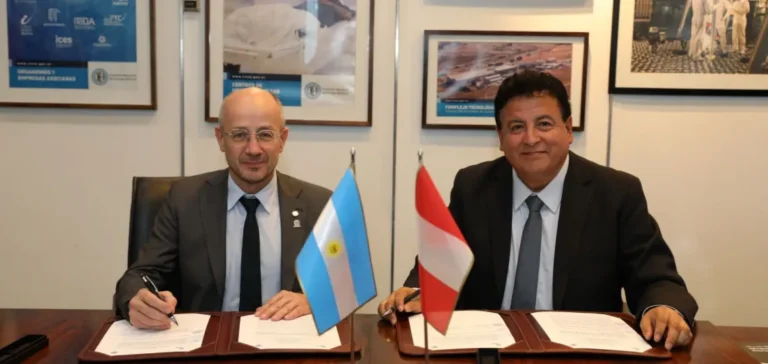Officials from the Argentine and Peruvian nuclear sectors have formalised an agreement designed to intensify their existing cooperation in civil nuclear technologies, marking a new stage in the bilateral exchanges initiated several decades ago. Germán Guido Lavalle, President of the Comisión Nacional de Energía Atómica (CNEA – National Atomic Energy Commission), highlighted the durability and significance of this strategic partnership in research and technical training.
Reactors exported for scientific purposes
Historically, Argentina has already exported two research reactors to Peru, strengthening close scientific cooperation between the two countries since the 1970s. The first, named RP-0, was commissioned in 1978 at the facilities of the Instituto Peruano de Energía Nuclear (IPEN – Peruvian Institute of Nuclear Energy), while the RP-10 reactor, used for radioisotope production and research, has been operational near Lima since 1989.
Today, this new agreement signed between Germán Guido Lavalle for Argentina and Rolando Páucar Jáuregui, head of IPEN for Peru, aims to strengthen bilateral exchanges, particularly through new joint projects. These mainly target the development of training programmes and the execution of collaborative scientific research.
Commitment to key areas of civil nuclear energy
Priority areas of the agreement include health, agriculture, and nuclear applications for scientific research. Both institutions involved, the CNEA and IPEN, have committed to continuing cooperation centred on technical and scientific development, thereby reaffirming their shared commitment to promoting peaceful uses of civil nuclear technologies.
Argentina currently operates three nuclear power generating units: Atucha 1 (commissioned in 1974), Atucha 2 (2014), and Embalse (1983). These facilities generate approximately 5% of the national electricity. While a fourth unit, Atucha III, now seems unlikely, Buenos Aires is instead focusing its future developments on Small Modular Reactors (SMRs).
Argentine SMR prototype facing uncertainties
Among these new technologies is the CAREM prototype (Central Argentina de Elementos Modulares), with an envisaged capacity of 32 MWe. Initiated in 2014, the construction of CAREM has experienced repeated suspensions over several years, primarily due to budget uncertainties. This prototype, the first fully designed in Argentina, is around two-thirds complete, with a Critical Design Review having been ordered in May 2024 to clarify its immediate future.
The Argentine company INVAP, which is currently constructing the versatile RA-10 reactor, previously built several reactors for both domestic and international clients, including Peru.






















